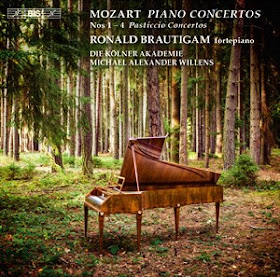Friday, August 19, 2016
Top Drawer Recording of Middle School Mozart
The final album in the great BIS series of Mozart Piano Concertos with Ronald Brautigam and Die Kolner Akademie under Michael Alexander Willens contains Mozart's least important works, but it says so much about the players that there's so much to enjoy in this release, due on October 14, 2016. These four concertos from Mozart's pre-teen years are pastiches of sonata movements written under the guidance of Dad, but they show a real flair. Let's not forget that the keyboard concerto was in its infancy. There's a natural dramatist working with this mainly banal material, punching up contrasts and adding zest and heart to galant stereotypes. I'm sure Papa helped join the dots, but there's little evidence of a natural dramatist in what I've heard of Leopold Mozart's published works.
I've always liked another very fine disc with the fortepiano, on Decca with Robert Levin and the Academy of Ancient Music under Christopher Hogwood. But I know this music best as played by Murray Perahia on a piano, and conducting the English Chamber Orchestra. I used to have an audio-cassette of this, and played it in my car in the days before we could get CBC Radio2 in Red Deer. Listening to it now, though, was a major disappointment; compared with the light and grace of both Levin and Brautigam, I found Perahia bloated. The Andante from the 2nd Concerto K.39, based on a lovely movement from a violin sonata by Schobert, has always been my favourite piece from this set. Here's Perahia's version:
Both Levin and Brautigam play this music as a somewhat brittle precursor to the slow movement of K. 467, written 14 years later. But Perahia adds a bit too much weight, I feel, perhaps more than the slight music can bear. By the way, in the later concertos I'd cheerfully listen to Perahia; his concerto series is awesome, but with this one exception.
Levin or Brautigam? I'll choose Brautigam here, by a bit. He makes the most of this charming music. So much of the credit goes, of course, to Willens and Die Kolner Akademie. Their thoughtful, musicianly partnership has made the BIS series a joy from start to this marvellous finish.

No comments:
Post a Comment